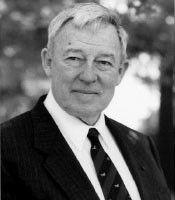
Inducted in May 1998 for pioneering work and outstanding contributions in the area of kinetic theory of transport phenomena in polymeric fluids.
R. Byron Bird established the subject of transport phenomena as a distinct discipline in chemical engineering. The landmark book, Transport Phenomena, co-authored with Stewart and Lightfoot, illustrated how the conservation laws of mass, momentum and energy can be applied at: 1) the molecular level in the development of kinetic theory; 2) the continuum level in the development of equations of change; and 3) the macroscopic balances for large pieces of equipment. In his research he has been involved with applying these principles to the dynamics of polymeric fluids, from both the continuum and the molecular points of view, and revealing some remarkable counter-intuitive flow phenomena.
Bird started his career in chemical engineering as an undergraduate student at the University of Maryland in 1941, but was called to serve in the Army in 1943 during World War II. After the war he resumed his studies to earn a B.S. degree in chemical engineering from the University of Illinois in 1947 and a Ph.D. in chemistry from the University of Wisconsin in 1950.
After spending a year at Cornell University as an Assistant Professor of Chemistry, Bird joined the University of Wisconsin as Project Associate in Chemical Engineering in 1953. In 1957 he was named Professor of Chemical Engineering at the University of Wisconsin, where he spent the remainder of his academic career.
Bird has received numerous awards. Among these are the William H. Walker Award, the Donald L. Katz Award, the Bingham Medal, the Warren K. Lewis Award, the Corcoran Award, the Hilldale Award, and the Founders Award of the American Institute of Chemical Engineers. In 1998, Bird was the first recipient of the Distinguished Chemical Engineering Alumnus Award from the University of Maryland.
Bird holds honorary doctorates from the Delft University of Technology in the Netherlands, from the Technion in Israel, from the ETH in Switzerland, from Kyoto University in Japan, as well as from five universities in the U.S. He is a member of the National Academy of Engineering and of the National Academy of Sciences, as well as a foreign member of the Royal Netherlands Academy of Sciences and of the Royal Belgian Academy of Sciences. Bird received the National Medal of Science from President Ronald Reagan in 1987.
Top